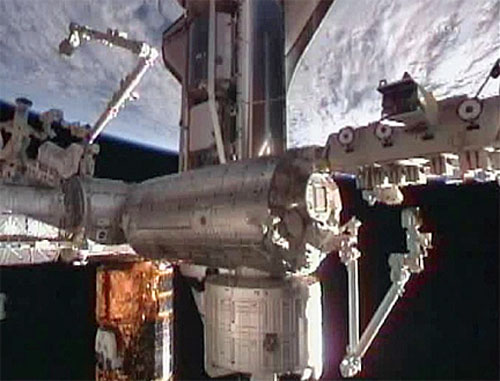Shuttle Astronauts Get Extra Sleep After Late Work Night in Orbit

Breaking space news, the latest updates on rocket launches, skywatching events and more!
You are now subscribed
Your newsletter sign-up was successful
Want to add more newsletters?

Delivered daily
Daily Newsletter
Breaking space news, the latest updates on rocket launches, skywatching events and more!

Once a month
Watch This Space
Sign up to our monthly entertainment newsletter to keep up with all our coverage of the latest sci-fi and space movies, tv shows, games and books.

Once a week
Night Sky This Week
Discover this week's must-see night sky events, moon phases, and stunning astrophotos. Sign up for our skywatching newsletter and explore the universe with us!

Twice a month
Strange New Words
Space.com's Sci-Fi Reader's Club. Read a sci-fi short story every month and join a virtual community of fellow science fiction fans!
This story was updated at 12:45 p.m. ET.
HOUSTON – Astronauts on the shuttle Discovery have a busy day of unpacking ahead as they dig into a big delivery job at the International Space Station. But first, they got a chance to catch up on their sleep.
Discovery arrived at the space station yesterday (Feb. 26) to kick off a weeklong stay at the orbiting laboratory. But their entry into the space station was delayed, pushing them behind schedule for another chore: installing a big spare parts platform they'll use later in their mission.
So the six shuttle astronauts and six station crewmembers opted to work late to finish the complex robotic arm operations needed to move the cargo platform from Discovery's cargo bay to a point the station's backbone-like truss where astronauts can reach it during the mission's two spacewalks.
Because of the delays after docking, the astronauts ran more than an hour behind schedule with the chore. Mission Control gave the two space crews an extra half hour of sleep to make up for the late work night. [Photos: Space Shuttle Discovery's Final Mission]
"The crew elected to stay up about an hour and a half or so late into their work day to finish up," said NASA's flight director David Korth during a briefing today. "We let the crew sleep in this morning, 30 minutes or so, to make up for the time spent last night to get that accomplished."
The astronauts were roused from their slumber at 7:23 a.m. EST (1223 GMT) this morning. Discovery is delivering supplies, spare parts, an extra storage module and a dextrous humanoid robot assistant named Robonaut 2 to the space station.
Breaking space news, the latest updates on rocket launches, skywatching events and more!
Checking for damage
Meanwhile, engineers on the ground are evaluating 302 photos of Discovery's backside taken by astronauts onboard the station before the orbiter docked yesterday.
The photos show high-resolution imagery of the shuttle's heat shield tiles that must be analyzed to make sure the tiles didn't sustain damage from falling debris during Discovery's liftoff.
The images are still being studied, but mission managers think the heat shield is in good shape and no further inspection will be needed.
"Everything is going really well with the orbiter," Korth said. "The orbiter crew is doing well. From a station side, all things are nominal."
Time to unpack
Today, Discovery's six shuttle astronauts and the station's own six-person crew will spend most of their time transferring cargo and supplies from the shuttle to the orbiting laboratory.
The day's chores will primarily consist of unpacking, moving, and allowing the crew time to get situated on the station, shuttle flight director Bryan Lunney told reporters yesterday.
Two of the spaceflyers, mission specialists Steve Bowen and Alvin Drew, will also spend part of today reviewing procedures for their first of two spacewalks on Monday (Feb. 28).
Bowen was a late-addition to Discovery's crew. He replaced astronaut Tim Kopra as the mission's chief spacewalker following a bicycle accident that sidelined Kopra.
Discovery's 11-day mission, the STS-133 spaceflight, is Discovery's final flight before NASA retires its space shuttle program later this year.
Only two other shuttle flights remain after this one, so NASA wants to load the space station up with as many spare parts as possible to prepare it for its looming life without the shuttle fleet's support.
You can follow SPACE.com Staff Writer Denise Chow on Twitter @denisechow as she covers Discovery's final space voyage from NASA's Johnson Space Center in Houston. Visit SPACE.com for complete coverage of Discovery's final mission STS-133.

Denise Chow is a former Space.com staff writer who then worked as assistant managing editor at Live Science before moving to NBC News as a science reporter, where she focuses on general science and climate change. She spent two years with Space.com, writing about rocket launches and covering NASA's final three space shuttle missions, before joining the Live Science team in 2013. A Canadian transplant, Denise has a bachelor's degree from the University of Toronto, and a master's degree in journalism from New York University. At NBC News, Denise covers general science and climate change.
